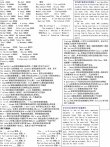2018届浙江大学附属中学高考科目全真模拟
英语试卷
选择题部分
第一部分:听力(共两节,满分30分)
做题时,先将答案标在试卷上。录音内容结束后,你将有两分钟的时间将试卷上的答案转涂到答题纸上。
第一节(共5小题;每小题1.5分,满分7.5分)
听下面5段对话。每段对话后有一个小题,从题中所给的A、B、C三个选项中选出最佳选项,并标在试卷的相应位置。听完每段对话后,你都有10秒钟时间来回答有关小题和阅读下一小题。每段对话仅读一遍。
1.Where does the conversation take place?
A.In a restaurant.
B. In a coffee shop.
C. In a hotel.
2.How many children does the woman have?
A. Two.
B. Three.
C. Four.
3.What is the man’s problem?
A.He can’t hear things clearly.
B.He has to study English at home.
C.He seldom practices English listening at home.
4.Why did the woman stop typing?
A.Because she has two more days and isn’t worried.
B.Because she finished typing her paper.
C.Because she has sore hands.
5.What does the woman mean?
A.The man should not give up.
B.The man didn’t practice enough.
C.The man should find a new partner.
第二节(共15小题;每小题1.5分,满分22.5分)
听下面5段对话或独白。每段对话或独白后有几个小题,从题中所给的A、B、C三个选项中选出最佳选项,并标在试卷的相应位置。听每段对话或独白前,你将有时间阅读各个小题,每小题5秒钟;听完后,各个小题将给出5秒钟的作答时间。每段对话或独白读两遍。
1
听第6段材料,回答第6至8题。
6.What’s wrong with the woman?
A.Her legs got hurt by boiling water.
B.There’s something wrong with her left leg.
C.She got a pain in her right leg.
7.How will the man treat her?
A.He will give the woman some medicine.
B.He will give the woman some tests.
C.He suggests she go to another hospital.
8.Which of the following statements is true?
A.The woman can’t sleep well.
B.The man thinks the illness is very serious.
C.The woman can’t walk about now.
听第7段材料,回答第9至11题。
9.What is the style of the meal?
A. American.
B. Chinese.
C. Italian.
10.How much do the speakers pay in total?
A. $30.
B. $50.
C. $55.
11.How is the charge calculated?
A. By person.
B. By weight.
C. By frequency.
听第8段材料,回答第12至14题。
12.What will take place at Bill’s house tomorrow?
A. party.
B. A game.
C. A dance.
13.Why is Joan going to visit Lisa after work?
A.Because Lisa is sick in bed.
B.Because she has to return something.
C.Because she is going to take her to Bi ll’s house.
14.What time will Joan most likely arrive at Bill’s house?
A. At 7:00 p.m.
B. At 8:00 p.m.
C. At 9:00 p.m.
听第9段材料,回答第15至17题。
15.Why is Freda not satisfied with the outfit?
A. For the style.
B. For the color.
C. For the size.
16.Where does Freda come from?
A. America.
B. Italy.
C. France.
17.What is the probable relationship between the two speakers?
2
A.Husband and wife.
B.Salesman and customer.
C.Colleagues.
听第10段材料,回答第18至20题。
18.Which country produces most good cameras nowadays?
A. America.
B. Germany.
C. Japan.
19.Who are the interviewees of our research?
A.Camera designers.
B.Camera producers.
C.Camera users.
20.What do we know from the conversation?
A.Olympic BY costs only $200.
B.Similar American cameras are cheaper.
C.Olympic BY weighs only 420 grams.
第二部分阅读理解(共两节,满分35分)
第一节(共10个小题;每小题2.5分,满分25分)
阅读下列短文,从每题所给的四个选项(A、B、C和D)中,选出最佳选项,并在答题卡上将该项涂黑。
A
On a cool gray morning, Wilson Kasaine heads out along a dirt path in southern Kenya. His calmness makes it e asy to forget that he’s tracking one of the most dangerous animals in the world: lions. Born into a traditional Maasai family, he quickly grew to understand the beauty and danger of wildlife. Living with big wild animals forces him to develop a good sense of where they have been and where they may be going. During his 12-kilometer walks to and from school, he learned how to tell the paw prints of a lion from those of other animals.
Growing up, Kasaine knew that improving his tracking abilities would help him avoid surprise meetings with dangerous animals. For many Maasai, tracking is mainly a matter of self-protection. But Kasaine is tracking lions to meet them and to protect them. He leads a small group of wide-eyed tourists over the red sandy path, searching for the lion that has left upon it his prints.
Each year, thousands of tourists crowd Kenya’s national parks to try to catch a glimpse of the the "big five”: elephants, rhinoceros, leopards, buffaloes and lions. The international draw of these animals matters a lot because the nation’s economy is tied to the protection of its wildlife. If Kenya’s wildlife disappears, so does its second-
3
本文来自投稿,不代表微盟圈立场,如若转载,请注明出处:https://www.vm7.com/a/wendang/112495.html




